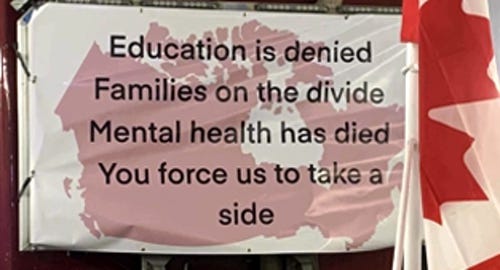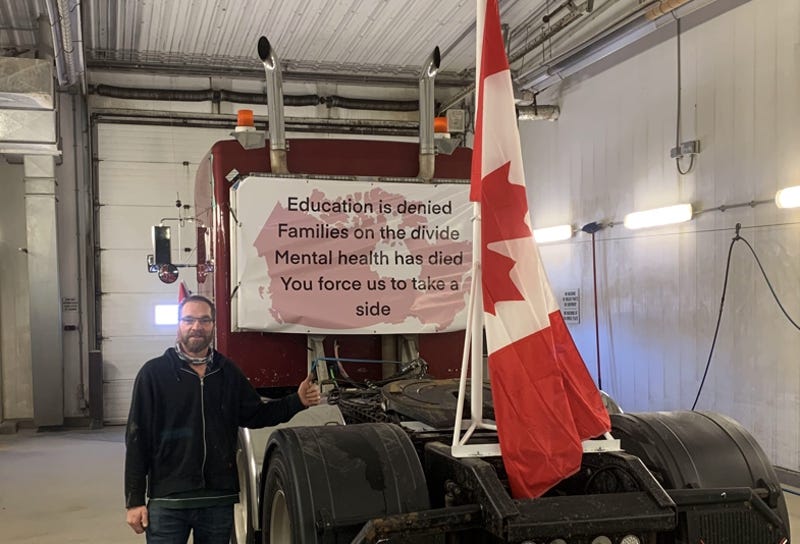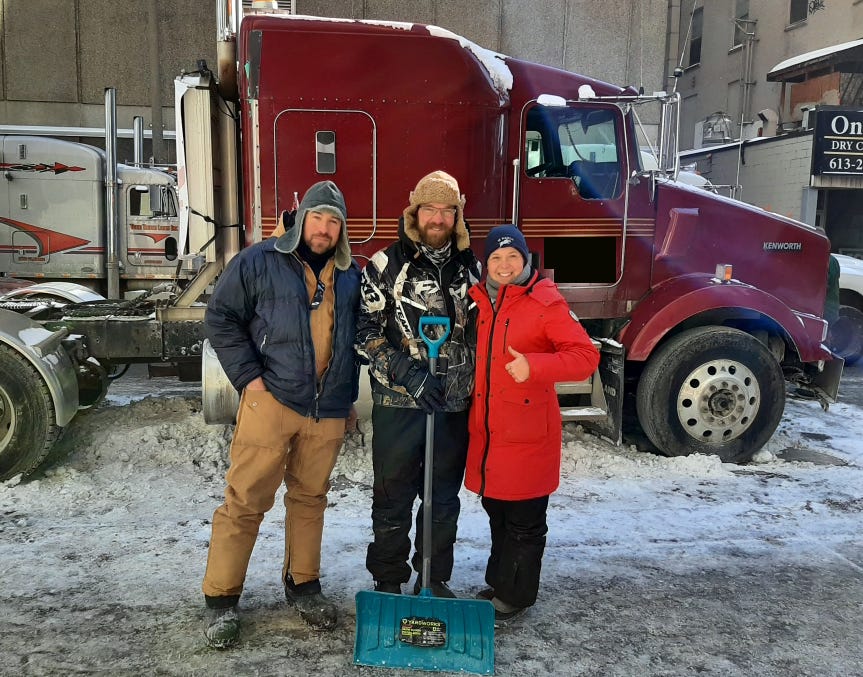We Came Peaceful, We're Leaving Peaceful (Part 3 of 3)
Clarence saw police 'beating people with their batons, and people falling back into the crowd, hurt.'
Part 1: The Biggest Flag I Could Put on There
Clarence Penner, the cross-border trucker from Winnipeg, traces his family’s vaccine skepticism to adverse reactions his first two children experienced with childhood vaccines. His wife began reading the medical literature and, by the time their third was born, “She said, ‘No, she’s not getting all the needles.’ Our trust went way down. If you research where they started and how they’re promoted, even the regular ones, a lot of them got brought in crooked,” he says. “You gotta dig deep.”
He himself has never taken a flu shot, only sees a doctor when he needs a medical exam for his trucker’s license, and says he wasn’t going to be amongst the first to take a COVID vaccine. “I’m not saying I wouldn’t have taken it if I needed to. But for me, there has to be a serious reason.”
From the beginning, his perspective was informed by real world observation rather than media hype. “I don't listen to media, hardly,” he says. “I never watch TV, I don't have time for it.” He left Manitoba, he remembers,
the day after they were locking down Winnipeg. I went to Florida. From Florida, I drove up into British Columbia. From BC, I went back down into Texas, I believe. And from Texas, I came back up to Canada. So I had crossed into how many states. And to see how absolutely every state was treating it differently. I just knew. If this really was a pandemic, they’d all treat it the same. There was too much politics, I didn't trust it.
On the final Friday of the Ottawa protest, Clarence was amongst those who witnessed police brutality firsthand, “I went down to the front row, where the police were pushing people back. I seen them beating people with their batons, and people falling back into the crowd, hurt.”
His blood ran cold, he says, at the sight of a riot squad in unfamiliar uniforms,
They weren’t the Ottawa police, whoever they were that got brought in. I was reminded of those movies where they clone people. They were all the same size, identical height. The Ottawa police were all sizes. You know, there's a six-foot-five beside a five-foot person. But that group that came in, you could have put a ruler across their heads. When they came marching down the street, I just knew this was over. Like, there’s nothing we can do.
The government, he says, was making it plain that peaceful protest and moral persuasion were pointless.
Late that afternoon, he went to greet his wife who’d just arrived in town and had booked into a hotel on the outskirts. “I left my keys with one of the other drivers and told him, if the police come around, just open the door for them, so they don't break stuff.”
By then, the downtown core was being locked down. Katia, who’d been regularly bringing Clarence vegetable plates and homemade dip, “found out what was going on, she came as close as she could with her car, to give me a ride to the hotel that night.”
The next morning Clarence received a text from one of the truckers near where his rig was parked. They’d decided, as a group, that it was time to leave. “We came peaceful, we’re leaving peaceful,” they told him. “And so my friends on that block on Wellington, they had an extra friend there that actually drove my truck” a few minutes away, “while I tried to make it back into the Red Zone.” Eventually, with the help of a couple of locals, Clarence jumped some fences and got his rig back. “That was a pretty shook up day,” he remembers,
Later, me and my wife went downtown just to see where we’d parked. It was so tense when we got back in there, it just wasn’t the same. She missed it. I’d sent her videos, so she knew what it was like. But she didn't really experience it. We went right up to the police barricades, there was a whole group of protesters still there. Later, I heard that just before we got there the police had been firing rubber bullets. And to think the crowd was still singing O Canada in light of how they’d been treated. It was a different kind of touching. It wasn’t a celebrating atmosphere, but you could see they were still standing up for Canada.
He’ll never look at police the same way again, he says. And yet, “I do feel that so many of them were just like us. Pretty much the first Ottawa police officer I seen coming in, he’s directing traffic” while discreetly holding up two fingers in a peace sign close to his chest.
The snow shovel Katia and René brought Clarence is now a permanent fixture on his truck. It accompanies him everywhere. “To me, Quebec was so foreign,” he says. “You know, the east and west have always got a bit of a divide happening. Never, ever would I have dreamt. Katia lives in Ontario, but she’s a Quebecer, she totally grew up in Quebec. To have all these French friends now, I would never have dreamt that. If I go there, they treat me like a king, like a celebrity.”







Thank you for your testimony, thank you for your bravery and strength of mind